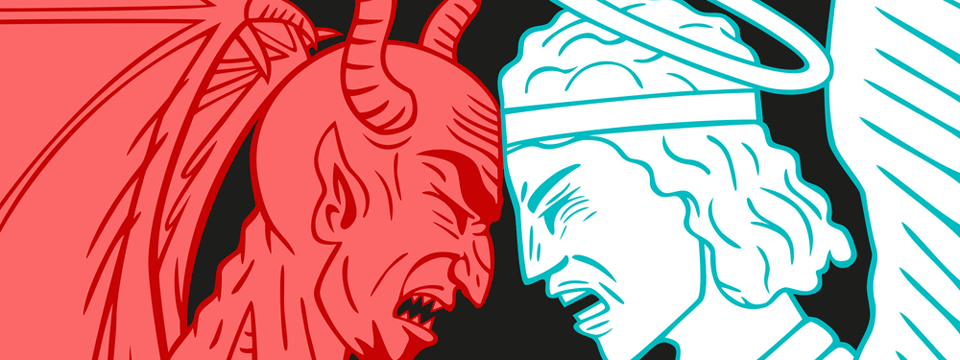
by Laura Wilcox | Oct 21, 2014
As a little girl, nothing—and I mean nothing—captivated me like a good story. In fact, it was my love of fairytales that occupied my time during twelfth-grade calculus. Sorry, Mrs. Bowman. Obviously this appreciation for fiction has influenced my work as an author, but it has also made me question spirituality’s role in great storytelling.
Now, I’m a Disney-fanatic to the core. Mouse ears, sing-along songs, the works. And if Walt’s legacy has taught us anything, it’s that happy endings sell. But what is it about a prettily packaged conclusion that draws us in? Is our fondness of happy endings an acquired taste, or could this reflect our origin and design?
Roughly 1,800 years after the first fairytale was written, our most culturally popular books and movies still hinge upon heroic themes like justice, love, courage and good will. I would even argue that fairytales are the most timeless stories out there. Obviously we are encouraged by happy endings, but is that just wishful thinking or prophetic hardwiring?
You see, our history as a species resembles a fairytale in a lot of ways. We’ve got an ongoing war between righteousness and evil, an extensive cast of villains and heroes, and a supernatural presence. Don’t forget the happy ending—our enteral reunion with Christ. In a way, it almost seems like God’s design for the world inspired the basic fairytale archetype.
Because we are formed in the likeness of God, we are born with an appreciation for holiness—things like beauty, love, harmony, joy, peace. We love hearing that good conquers evil because someday it will (Romans 16:20). We rejoice when love trumps all because it does (1 Peter 4:8). Maybe our appreciation of well-woven stories is just a symptom of our thirst for holiness—our innate craving for God.
Hans Christian Anderson once said that life itself is the most wonderful fairytale. The great saga of humanity is unfolding right in front of us, and we’ve been given a place in this adventure. We simultaneously script our own lives while contributing to God’s never-ending narrative.
Maybe we are hard-wired for happy endings, or perhaps I’m just a crazy English grad. Either way, we are all part of the most wonderful fairytale of all—the life God has given us.

by Laura Wilcox | Aug 21, 2014
If God is an omniscient God, why did He create Satan knowing it would lead to the fall of mankind? This is a question I’ve been wrestling with a lot lately, and Google tells me I’m not alone. The Bible says there are some things we cannot understand, but this is not a good excuse for failing to examine the more challenging aspects of faith. After a little research, I have come up with a few possible solutions to this messy but very important question.
1. Free will cannot exist without evil.
We know that God is a big advocate of free will because He wants His followers to obey by choice, out of love. Free will cannot exist without two opposing choices, and this could be why God created Satan despite knowing that He would introduce evil to the world. To stop Satan’s rebellion would also deny the devil of his own free will.
2. All creations are originally good.
Genesis 1:31 says that God created all things to be very good. Satan, and later mankind, chose to live outside of His established law and are therefore responsible for the consequences. Essentially, God did not create Satan the destroyer. He created Lucifer the most angelic being in Heaven. The fault is in Satan, not God.
3. God knew Satan would be temporary.
Satan may wreak havoc upon Earth, but he has no place in Heaven according to Revelation 12:8. The Earth is designed as a temporary home, and Revelation 20:10 says that Satan will eventually be overthrown for good. God may have allowed Satan to rebel knowing that this temporary destruction could ultimately reveal his eternal glory.
4. God has the power to know all things, but chooses not to.
According to Job 28:24, God has the ability to see everything of the past, present and future. Jesus claims that he does not know the time of the second coming in Matthew 24, though he possesses the fullness of God. This could be part of Jesus’s human nature, or it could be an indication that God chooses to limit his foreknowledge.
5. Satan was crucial to a Heavenly dialogue.
When Satan took one-third of Heaven’s angels with his rebellion, he openly questioned God’s authority. God had already established His character as pure and holy, so to obliterate Satan would encourage other angels to praise Him out of fear and not love. It would also eliminate free will from the equation.
Again, these are just possible solutions. There is no way to say for certain which, if any, of these answers are true. Or maybe they’re all true! But that shouldn’t keep us from speculating or looking to the Bible in pursuit of answers. The possibilities are limitless, and I am hoping to hear a few more perspectives. That being said, why do you think God created Satan?

by Laura Wilcox | Aug 5, 2014
Like any Saturday in June, it was hotter than blue blazes. I stood outside on my tiny screened-in patio, sweat dripping down my back and paintbrush in hand. My grandma’s half-stripped coffee table was right in front of my face as I squatted down to tackle the last of the old speckled stain.
Then, just five minutes in, the unthinkable happened.
When brushing over a corner a little too carelessly, two pea-sized blobs of paint stripper flicked off the brush and straight into my eyes. That’s right – into both eyes. It felt like someone had tucked a pair of little acidic fireballs right under my lower eyelids. I immediately dropped the brush and raced for the kitchen sink.
“It’s in my eyes!” I yelled. “THE PAINT STRIPPER IS IN MY EYES!”
My boyfriend/partner-in-craft rushed around the corner. I dunked my entire head under the sink and ran the water down my cupped hands like two endless waterfalls. All I could think about was going blind and the paralyzing possibility of seeing only darkness for the rest of my life. What kind of future would that be?
“Read the bottle!” I yelled. My long hair kept dipping into the garbage disposal and fishing out old food. “What does it say to do now? Am I going to go blind? Am I going to go blind?”
“It says to always wear eye protection,” he replied unhelpfully at first. “Okay, okay. Rinse eyes thoroughly for ten to fifteen minutes…”
He stopped.
“And?”
“Seek immediate medical attention.”
“I’m going to be BLIND,” I cried.
I spent those next few minutes submerged in total panic and weirdly deep contemplation. I thought about how God would somehow use my blindness to glorify Him. Isn’t that how we justify our seemingly pointless suffering, after all? I also thought about how much I didn’t want that gift and begged for an exchange.
“Didn’t you ask me if I would love even if you were blind? Last week, right?”
My boyfriend was right. While listening to The Fault in Stars on audiobook, I did in fact ask him if he would love me even if I went blind. But hypotheticals are only fun when they stay hypothetical. I asked out of curiosity, not because I actually planned on going blind.
I kept my head planted firmly under that faucet for ten minutes, until I was too waterlogged to blink. After a mild bout of hysteria I came up. My eyes were puffy and red – from tears or chemicals, I couldn’t tell. After a close inspection, multiple phone calls and several hours of waiting, my eyes returned to normal. Not burned, not blind.
But that doesn’t mean the whole experience didn’t matter. It did.
There are a lot of potential morals to this story – safety first, no one is invincible, love is blind, don’t take things for granted, etc. Those are all fine lessons to learn, but they’re not the most important one.
Whether or not I actually could have been blinded by the amount of paint stripper in my eye is debatable, but I was terrified nonetheless. This was my eyesight, after all. I am now acutely aware of how quickly life can change, and that realization makes me more grateful than ever to serve a God who plans for the unplanned.
While I am so grateful that nothing happened, I know not all situations in life end happily. People do go blind and worse, as unpleasant as it is to think about. Eventually bad things will happen – but when they do, I know I have a God who is always working for my good.
And that’s a future inarguably worth seeing.

by Laura Wilcox | May 20, 2014
I was called to be this, called to do that, called to move there. We hear it all the time. But being “called” is a curious thing, isn’t it? For the longest time, I used to think being called meant fulfilling aspirations in the name of God. Like the “Get Out of Jail Free” card of spiritual decision-making. As in Monopoly, though, there are only a few of these cards out there, reserved for a lucky few.
Until a few years ago, I believed that God only called His followers to one of three things – ministry, missions or medicine. Everything else was a blurry gray scale of confusing decisions and critical crossroads. God doesn’t call people to telemarketing. He doesn’t call them to sports PR, aviation mechanics or any other nine-to-five.
He also doesn’t call people to become authors.
This is what I believed until recently – until Falls Creek. Throughout my five-day stay, the worship band strummed out Hillsong’s “Mighty to Save” night after night. And there was always one line I could never shake, a line that scrolled through my mind like a marquee every night before falling asleep.
“Author of Salvation.”
Little did I know, that was the first of many nudges God would toss my way over the coming years. From small group to Sunday school, camp to weekend retreats – the writing references were everywhere. No, really. Everywhere. Of course, I fought it. Doubt, self-fulfillment, misinterpretation, anxiety…whatever I was feeling, it couldn’t be from God. God simply does not call writers.
Except He did.
 On April 1, 2014, I published my first novel – a science fiction time traveler piece by the name of Renegade. They say late obedience is disobedience, but I disagree. Although I did not write this book simply because I felt called to do so, I realize now God was laying the groundwork years ago. He was just kind enough to let me look over His shoulder.
On April 1, 2014, I published my first novel – a science fiction time traveler piece by the name of Renegade. They say late obedience is disobedience, but I disagree. Although I did not write this book simply because I felt called to do so, I realize now God was laying the groundwork years ago. He was just kind enough to let me look over His shoulder.
“But you wrote the book. You put in the time, effort and money. It’s not as if God Himself came down and whispered the words into your ear,” a skeptic might say. True. But He provided the money, made way for the time and set fire to my pen. It might sound cheesy to say that God called me to be an author, but sometimes the truth is just that. Cheesy.
And even though Renegade is not a religious piece, I’ve learned a lot over the past year about the electric marriage between faith and fiction. More importantly, though, I witnessed the mighty and amazing ways God can move through something small. It’s comforting, thrilling and empowering all at once – inspirational, to say the least.
If you are interested in checking out Renegade for yourself, you can buy it for Kindle at $3.99 here or in paperback for $9.99 here. You can also like the Facebook page and join the conversation on Twitter using #ReadRenegade. Whether it’s by sharing this blog post or posting the Renegade link to Facebook, I would love to have your help sharing my story. Why? Because it brings to light one very important question.
If the Author of Salvation can make an author out of me, what can He do in you?

by Laura Wilcox | Apr 23, 2014
This past week, I had the privilege of interviewing my former band director, Mary Jo Sharp, for a class writing assignment at the University of Oklahoma. The assignment was meant to capture the day-to-day work of a current professional, a sort of “on the job” piece if you will. Immediately I thought, who better than the first woman to become a Certified Apologetics Instructor? No one, that’s who.
Although I never meant to publish her replies outside of the assignment, I found her thoughts and commentary on apologetics too good to hide. If – like me – you’re not entirely certain what an apologist does on a day-to-day basis, then maybe you will get a clearer picture of this small but powerful ministry through my Q&A with Mary Jo.
Q1: First off, what led you to apologetics?
Several years into ministry in the church with my husband, I began to have doubt about the existence of God. This doubt was born out of hurtful experiences with people who claimed that the Bible was the truth. I wasn’t finding people who were making a concerted effort to live like the Bible was true and this caused me to question whether there were any real believers in God at all. Then I began to question my own belief and wonder why I believed in God. I went looking for answers to these questions and in doing so, I had stumbled into a field called apologetics.
Q2: What is the most challenging part of your job?
My job entails a lot of public speaking in which I must answer numerous questions on the spot at conferences. At times, the people who ask me questions vehemently disagree with me. Handling these questions thoughtfully, while demonstrating grace and love, can pose a major challenge.
Q3: What do you do on a typical work day?
I have three kinds of typical work days: 1) an on-campus day at the university, and 2) a research/preparation day at home, and 3) an event day. Typically, I eat breakfast with my husband in the morning hours, if I’m at home. Then I spend the rest of the afternoon preparing for upcoming events, writing posts for social media, researching for my next study, answering emails and Facebook messages, and prepping for my courses at the university. After dinner and walking the dog, I return to my preparation, study and answering mail typically until 10 o’clock at night, but sometimes as late as one o’clock in the morning.
Q4: What is the most unusual experience you’ve had while working?
There was a festival in Michigan at which a couple of friends and I were engaging in conversation at an Islam Q&A booth. We were filming our conversation—which the people at the booth said we could do—when the festival security guards assaulted us. They hit our cameras, told us we couldn’t film, and bullied us out of the festival.
Q5: What type of person does best in apologetics?
The best type of person seems to be one who is not seeking any kind of affirmation from other people for their work. A person can get verbally abused in attempting to argue for a Christian worldview. Therefore, apologetics can be rough on the one who is seeking affirmation from the approval of men.
Q6: How do you juggle being an author, public speaker and professor?
I really have no idea how I make it from week to week! It must be the support I receive from friends, family, and my trust in God that get me to the next airport on time with my sanity in place. These three roles become extremely demanding at certain times of the year. I have moments when I feel overwhelmed. However, my husband always reminds me that the craziness comes in spurts and only lasts for a short amount of time. Plus, I try to create routines that intentionally calm my soul and center my mind.
Q7: Why do you think apologetics is an important discipline?
Studying a defense—or building a case—for what a person believes can greatly aid the person in understanding not only what they believe, but also why they believe it to be true. The process of reviewing evidences and reason for a belief can aid in peeling back presuppositions, biases, and traditions. For people who claim to love logic, reason and evidence, an open investigation of what they believe and of what has been informing their view of the world is essential. The Biblical text says ‘though it cost all you have, get understanding’ (Prov. 4:7) and also to always be ‘prepared to make a defense to anyone who asks you for a reason for the hope that is in you’ (1 Pet. 3:15).
If you’re interested in learning more about Mary Jo’s work, including books and upcoming speaking engagements, you can check out her personal ministry site, Confident Christianity.





